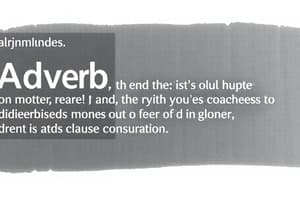Podcast
Questions and Answers
Which word is the most formal for explaining a reason?
Which word is the most formal for explaining a reason?
- Due to (correct)
- Since
- Because
- As
What is the structure used with 'due to'?
What is the structure used with 'due to'?
- Due to + verb
- Due to + noun (correct)
- Due to + adjective
- Due to + adverb
Which word is described as more conversational and less formal than 'due to'?
Which word is described as more conversational and less formal than 'due to'?
- Since
- As
- Due to
- Because (correct)
Which word is used to explain a reason and is also described as more conversational and less formal than 'due to'?
Which word is used to explain a reason and is also described as more conversational and less formal than 'due to'?
What structure is used with 'because'?
What structure is used with 'because'?
Flashcards are hidden until you start studying
Study Notes
Formal and Conversational Language
- The most formal word for explaining a reason is 'due to'.
Phrase Structure
- The structure used with 'due to' is: [Noun] + is + [adjective] + due to + [reason].
Conversational Language
- The word 'because' is more conversational and less formal than 'due to'.
- The word 'since' is also more conversational and less formal than 'due to', and is used to explain a reason.
Phrase Structure with 'Because'
- The structure used with 'because' is: [Independent Clause] + because + [Dependent Clause].
Studying That Suits You
Use AI to generate personalized quizzes and flashcards to suit your learning preferences.




